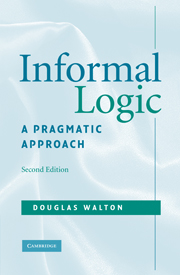Book contents
- Frontmatter
- Contents
- Preface
- Acknowledgments
- Informal Logic
- 1 Argument as reasoned dialogue
- 2 Questions and answers in dialogue
- 3 Criticisms of irrelevance
- 4 Appeals to emotion
- 5 Valid arguments
- 6 Personal attack in argumentation
- 7 Appeals to authority
- 8 Inductive errors, bias, and fallacies
- 9 Natural language argumentation
- Bibliography
- Index
Preface
Published online by Cambridge University Press: 05 June 2012
- Frontmatter
- Contents
- Preface
- Acknowledgments
- Informal Logic
- 1 Argument as reasoned dialogue
- 2 Questions and answers in dialogue
- 3 Criticisms of irrelevance
- 4 Appeals to emotion
- 5 Valid arguments
- 6 Personal attack in argumentation
- 7 Appeals to authority
- 8 Inductive errors, bias, and fallacies
- 9 Natural language argumentation
- Bibliography
- Index
Summary
The purpose of this handbook is to furnish the reader with the basic methods of critical analysis of arguments, as they occur in natural language in the real marketplace of persuasion on controversial issues in politics, law, science, and all aspects of daily life. This is very much a practical (applied) subject, because each individual argument is, to some extent, unique. The technique of applying the general guidelines of criticism for each type of argumentation scheme to each individual case requires practical skills of good judgment and judicious interpretation in identifying the argument, and sorting out the main thread of the argument from the discourse it is contained in. These are pragmatic skills requiring prior identification of the type of dialogue in which an argument occurs.
Logical semantics is an important subject in its own right. It is the construction of consistent and complete theories based on semantical constants and the use of variables. Chapter 5 is about semantics, but the remaining eight chapters are mainly about the pragmatics of argumentation. For the most part, applying critical rules of good argument to argumentative discourse on controversial issues in natural language is an essentially pragmatic endeavor. It is a job requiring many of the traditional skills associated with the humanities: empathy, a critical perspective, careful attention to language, the ability to deal with vagueness and ambiguity, balanced recognition of the stronger and weaker points of an argument that is less than perfectly good or perfectly bad, a careful look at the evidence behind a claim, the skill of identifying conclusions, sorting out the main line of argument from a mass of verbiage, and the critical acumen needed to question claims based on expert knowledge in specialized claims or arguments.
- Type
- Chapter
- Information
- Informal LogicA Pragmatic Approach, pp. xi - xivPublisher: Cambridge University PressPrint publication year: 2008



